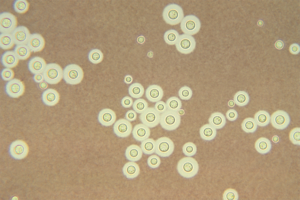
Researchers at the School of Medicine have identified a novel enzyme involved in building the cell wall of Cryptococcus neoformans, a fungus that causes lung infections and potentially deadly cases of meningitis, primarily in people with AIDS. About 150,000 people worldwide die every year of cryptococcal infections.
Because the fungal cell wall is both unique to fungi and necessary for the organisms' survival, many antifungal drugs work by disrupting this barrier. The cryptococcal cell wall, however, has some unique features that make it resistant to antifungal agents that work against other pathogenic fungi. The discovery of the new enzyme - dubbed glucan organizing enzyme, or Goe1 - deepens scientists' understanding of how fungal cell walls are built and suggests new ways to target the structure.
The study is by senior author Tamara Doering, MD, PhD, the Alumni Endowed Professor of Molecular Microbiology, and postdoctoral researcher Liza Loza and is published in Proceedings of the National Academy of Sciences.






